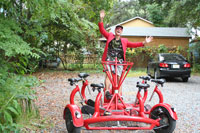Conference bikes provide unique way of traveling ’round’ St. Augustine

By Adrienne Sakyi
Narrow streets, limited parking and low speed limits — downtown St. Augustine creates the perfect atmosphere for a thriving bike culture. From tall bikes to round bikes, residents find bikes as a means to avoiding the hassles of cars.
Students have noticed the tall bikes that tower over cars. Most students do not realize that tall bikes are part of a worldwide phenomenon of communities based on bicycles. In St. Augustine, this community is called Bad Cactus. Individuals with tall bikes and fixed-gear bikes from Flagler and the local community join together to ride. Around the world this community is called Black Label and has chapters in Amsterdam, San Francisco and New York, among other cities worldwide.
The bikes are made by welding together parts of regular bikes and cannot be found at stores. The first tall bikes started appearing in the 1940s in Minneapolis, but can now be found all over the world.
On Fridays at 5 p.m., bike riders of all kinds gather in the plaza for “Critical Mass.” The group raises awareness of bike riders by riding in a mass around the downtown St. Augustine area. Critical Mass is another bike culture activity that occurs in many cities in America. At Critical Mass, individual goals range from promoting cyclists’ rights to angering motorists, but all are welcome regardless.
If this sounds harmless, tell that to the police officers that stopped the group twice during one two-hour Critical Mass. Protests for bike safety around the state may have had an effect on the Florida legislators. Earlier this month, a new Florida statute requiring a three-foot gap when passing bike riders was enacted. In the absence of bike lanes, the statute creates a safer environment for bike riders.
Dan Sorger, owner of The Dutch Bicycle Company on Aviles Street, participates in Critical Mass every week and said the tall bikes and bike riding are more than just a way of transportation.
“Bike riding is rejecting the culture of greed and disposable waste,” he said. “It says ‘I don’t need your oil, I don’t need your roads, I can do it on my own,'”
Clubs on-campus like Intervarsity have also embraced the bike culture with events like the “Bike for Awareness” earlier this month. “Bike for Awareness” was coordinated with a Rice and Beans Fundraiser and the showing of “Invisible Children” to raise awareness for children in Uganda.
For some bike riders, riding is not that serious. To many Flagler students, the bike culture is all about convenience. Adriana Sicari, senior communication major said, “I live downtown and there is no way I will ever find a parking spot closer than I live.”
David Saunders owns a conference bike that allows him to take up to six people around downtown making stops wherever the riders desire.
Popular stops include Scarlett O’Hara’s, A1A Ale Works and Tradewinds. The conference bike is powered by the peddling of each of the riders and is all about fun. They can be found across the country at fairs, conventions, and festivals.
“It’s the best way to see downtown,” Saunders said.


Be the first to comment on "They want to ride their bicycles"